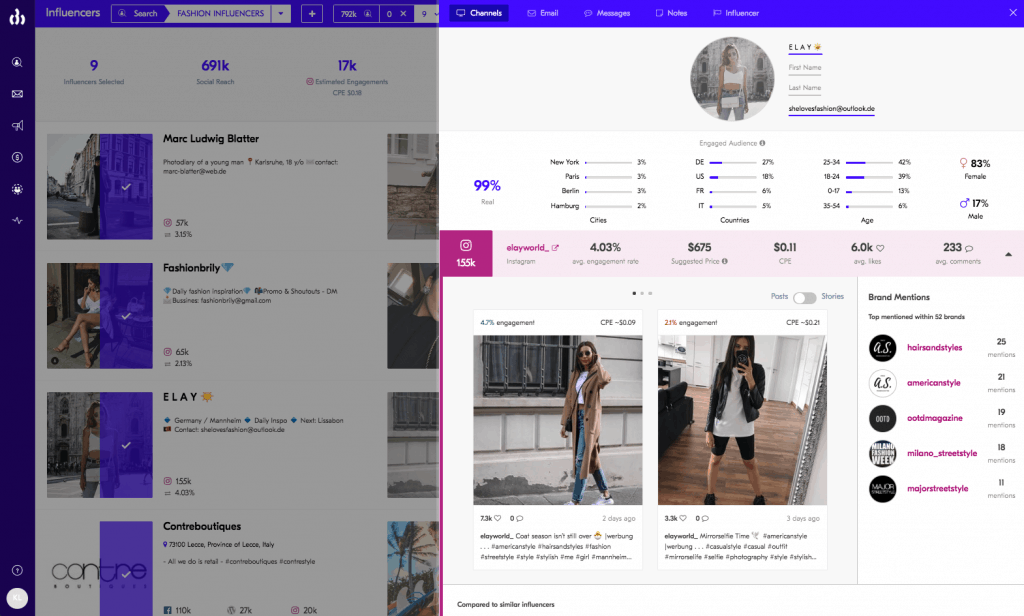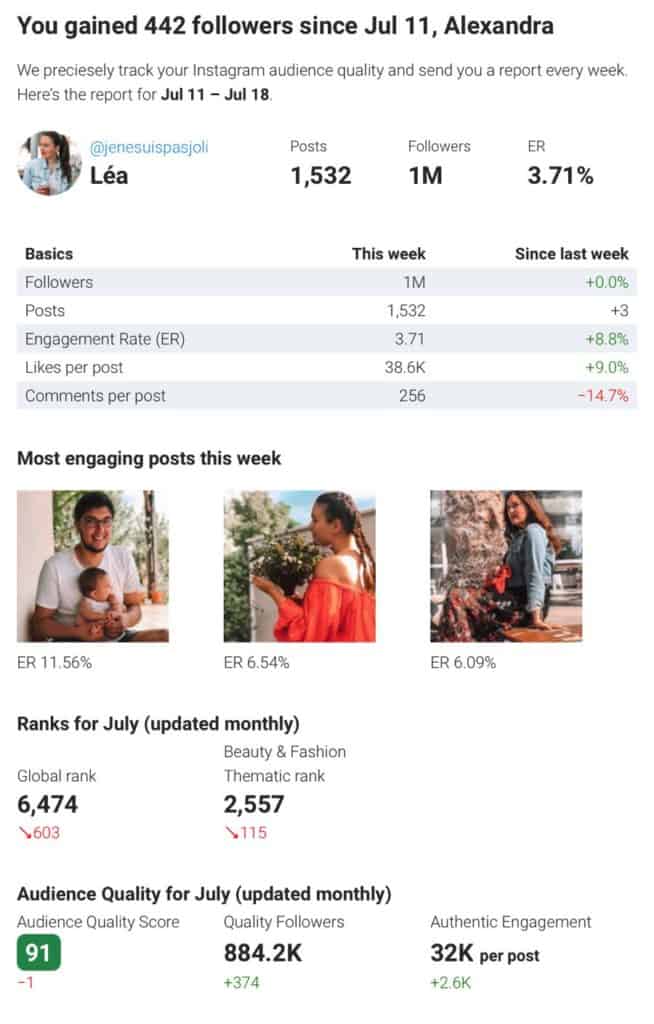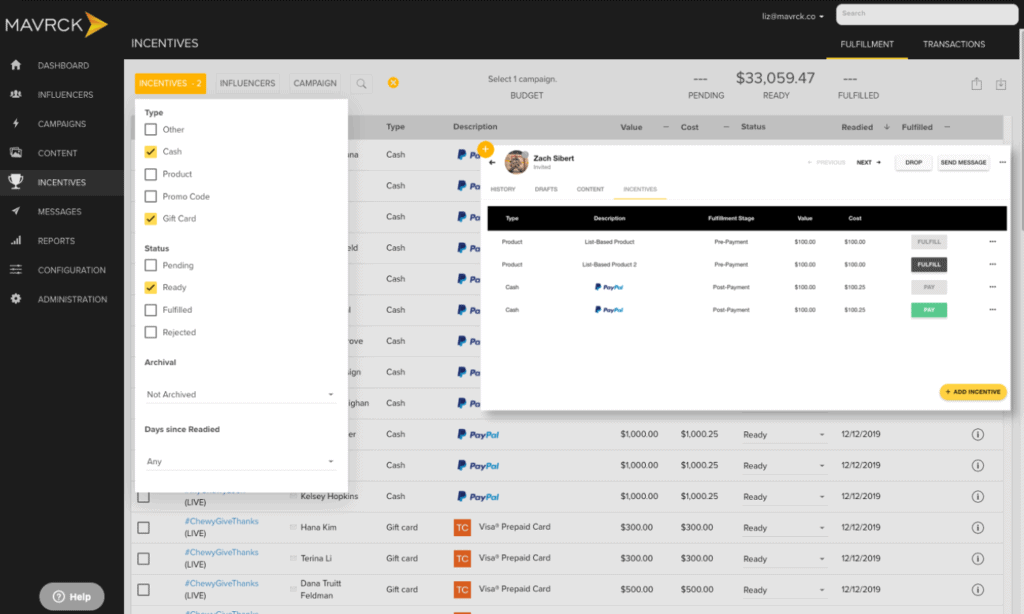With brands expected to spend $15 billion on influencer marketing by 2022, it’s no surprise that the landscape for identifying, vetting, and building relationships with influencers is changing drastically.
Instead of spending hours scrolling through social feeds, researching an influencer’s content and following, and then crafting an email that you hope gets noticed, many marketers are turning to a relatively new set of tools to find influencers: influencer search engines.
But before we get into our guide to influencer search engines, let’s review what influencer marketing is and how it works.
What is influencer marketing?
Influencer marketing is a digital marketing strategy that involves collaborating with influencers—social media personalities with large or highly engaged followings who are viewed as experts in their niche—to promote your brand or product. By developing relationships with influencers, you can get your brand or product out to a much wider audience than you would reach through only your own channels.
How effective is influencer marketing?
The Media Kix 2019 survey found that influencer marketing is a highly effective and viable marketing strategy.
According to the results:
- 80 percent of marketers agree that influencer marketing is effective
- 71 percent of marketers believe that the quality of customers and traffic is better from influencer marketing, and
- 89 percent of marketers say influencer marketing ROI is as good or better than other marketing channels.
Overall, 80 percent of marketers find influencer marketing to be effective. Note, however, that it will only work if you find the right influencers with the right followings for your product or brand. That’s where influencer search engines come into play.
How can I find influencers?
If you’re not using an influencer search engine, there are a few other ways to find influencers who might be right for your marketing campaign.
- Check industry trending hashtags on social media platforms. These will show you the most popular content attached to those hashtags, as well as who’s putting out that content.
- Search on Google for the kind of influencers that you’re looking for, as well as for blogs related to those topics.
- Visit other social networks like Twitter to see who’s trending. This will help you find people with strong profiles across platforms.
How do I find an influencer on Instagram?
Because so much of influencer marketing happens on Instagram these days, you may want to know how to find influences specifically on this platform.
- Take a look at your brand’s followers, to see if there are any influencers who are already fans.
- Search hashtags or use the Instagram Discover tool.
How do you get influencers to promote your product?
There are lots of ways to work with influencers, but some of these include:
- Social media promotions: an influencer agrees to post a certain number of times about your brand over a specified period of time
- Collaborative experiences, giveaways, etc.: your brand works closely with the influencer to create an experience or prize giveaway for one or more of the influencers’ followers
- Social media takeovers: the influencer “takes over” your brand’s social channels for a day
What is Instagram influencer marketing?
Instagram is a great tool for influencer marketing if your target audience includes Millennials (ages 24-39) and/or Gen Z (age 24 or under).
Why? Because these two age groups make up 71 percent of Instagram’s active user base. Instagram influencer marketing works especially well for this demographic because they have a marked distrust of traditional advertising. Influencer marketing allows them to be introduced to your brand by a trusted source (the influencer) on an authentic, casual platform (Instagram).
Now that we’ve gone over what influencer marketing is and how it works, let’s dive into influencer search engines. Influencer search engines are great tools to use if you’re looking for influencers for your next campaign, as many offer multiple search features, as well as communication, payment, and tracking tools.
- Upfluence
Upfluence is looking to be a “one-stop shopping” influence marketing SaaS solution. Upfluence is the only influencer platform that lets you identify organic influencers in a brand’s own customer base and website audience. Brands can collect social data when visitors are browsing their site or during checkout, analyze their social data, and add them to affiliate campaigns. Specifically, their software has influencer search, CRM, and ROI analysis.

Features:
- Premium influencer campaign management
- Product placement outreach
- Influencer event management
- Payment and transaction services
Who should use it:
- Agencies
- Brands
AspireIQ offers a traditional influencer search tool. Along with in-platform features for collaborating with influencers on branded content, they also offer a “Managed Services” (agency) option. AspireIQ describes itself as a community intelligence marketing platform built for advocacy. It considers your “community” to be like-minded customers, creatives, professionals, experts, employees, and brand representatives who share similar values and passion tied to your brand beyond the product or service you sell.

Features:
- Drive brand awareness
- Generate authentic content at scale
- Boost engagement and retention
- Improve your products
- Maximize your sales
Who should use it:
- Brands
- Marketers
- Content creators
HypeAuditor’s AI analyses and ranks bloggers by quality followers and authentic engagement. They gather raw data from different sources, depersonalize, and cluster it. They take only real followers and likes from them into consideration. The algorithm then ranks influencers and forms the global top influencers’ lists, updated daily.

Features:
Robust influencer data and analysis, including:
- Their current ranking (and the change since last month for some lists only)
- The influencer’s Instagram username
- Main topics the influencer posts about
- Their audience country
- Their followers
- An estimate of their authentic engagement
Who should use it:
- Brands
- Agencies
Looking for a YouTube superstar or a rising Instagram micro-influencer? NeoReach is a good platform to check out. The organization has managed more than $250 million worth of influencer marketing campaigns to date. This is an enterprise-level influencer marketing tool whose customers include Airbnb and Walmart.
Features:
- Find and manage talent with easy search features
- Coordinate each step of your campaign fulfillment process
- See what’s working and what isn’t with intuitive analytics
Who should use it
- Agencies
- Brands
Mavrck has become the leading influencer marketing platform for micro-influencer marketing. This is an advanced influencer platform aimed squarely at enterprise and Fortune 500 companies, so it offers more features and higher price points than others.

Features:
- Influencer marketing
- Ratings and reviews
- Referral programs
- Ambassador programs
- Digital focus groups and surveys
- Full-stack content creation
Who should use it:
- Enterprise brands
- Agencies
Popular Pays is a creative collaboration software that allows brands to work with content creators and influencers at any scale. The platform has a community of over 60,000 individuals with a robust search engine and relationship suite feature set. Users can collaborate one-to-one with selected partners via Threads, or at scale through the Campaign workflow tools. It’s best known for its TikTok influencer search engine.
Features:
- Find and vet influencers and creators
- Manage influencer and creator relationships
- Chat with influencers and creators
- Collaborate at scale
- Data and performance all in one
Who should use it:
- Brands
CreatorIQ was developed to offer influencer marketing that was more brand-safe, data-driven, and transparent to meet the increasing needs of marketers. Like Neoreach, CreatorIQ focuses on the enterprise market—its customer base includes Unilever and Disney.
Features:
- Audience profiles
- Growth history
- Cross-platform content to find, assess, and qualify over 15 million creators before adding them to your network
- Surface the best creators for your brand with the discovery engine built for scale
Who should use it:
- Enterprise brands
- Influencers
This platform allows you to organize influencers that fit your brand into lists and download their contact details in bulk. Get the aggregated metrics of the whole influencer list and see the scope of your campaigns. Heepsy analyzes the followers, likers, and commenters of the influencer in order to verify the influencers’ authenticity. The platform combines influencer search and audience analysis (for example, identifying the demographics of an influencer’s followers). Heepsy has a database of 7 million influencers on Instagram and YouTube.
Features:
- Create and export lists of your selected influencers
- Advanced filters for niche searches
- Influencer database
Who should use it:
- Brands
Influence.co takes a different approach when compared to most influencer platforms. Although Influence.co offers all the usual influencer marketplace services, it also acts very much like a social media platform. This helps brands sustain the types of authentic and long-term relationships that are intrinsic in influencer marketing. Influence.co now has a social network and marketplace with more than 250,000 members, 150,000 of whom are influencers, 70,000 businesses, and 30,000 others.
Features:
- Manage all aspects of your influencer marketing in one place
- Build and manage complete communities for every business
- Execute campaigns on clients’ behalf
Who should use it:
- Brands
- Agencies
- Influencers
Influencer marketing’s explosive growth happened when brands realized consumers were more likely to trust the recommendation of someone they know—and social media made it possible for everyday people to be known by increasingly large numbers of people. Post for Rent serves all sizes of brands, as well as agencies and talent managers, as well.
Features:
- See the demographics of the follower base for your selected influencers.
- Robust campaign and talent management
- Brands, agencies, and talent managers can manage their entire workflow, payments, and reporting.
Who should use it:
- Brands
- Agencies
- Influencers/Creators
Influencer search engines are just the latest development in the evolution of influencer marketing. If you’re ready to start an influencer marketing campaign, read our post “Influencer Marketing from A to Z: A Complete Guide for Businesses,” and then reach out!







